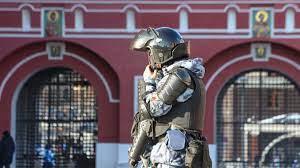In late 2005, I was sitting at a conference table in Washington with a group of young people from Chechnya. They were trying to win support for the scholarship program that had brought them from their war-torn homeland to universities in Europe. They were meeting with representatives from think tanks and grant-making foundations who mostly talked among themselves, since the Chechen students didn’t really speak English.
One think tank staffer said with fervor, “We should ensure these young Chechens become pro-Western.” None of the others (some of whom went on to high-ranking positions in subsequent presidential administrations) objected or so much as raised an eyebrow. Surely, I thought, these students, whose young lives had been blighted by war, who had lost loved ones and their homes, should be “pro-themselves.”
Surely we should support them unconditionally without ulterior motives. But I wasn’t surprised. This blurring between geopolitical jockeying and ostensibly altruistic support for civil society abroad is what compelled me into activism in the first place.
This conflation has become only more pervasive since then. It has not made geopolitics better: we are embroiled in the largest war in Europe since WWII and witnessing unprecedented levels of armed violence in Israel and Palestine. It has left civil society worse off: less safe and free, with its activists estranged from their communities and less able to achieve the liberal-democratic gains ascribed to them.
This applies to Russia and many other countries, adversaries and allies of the West alike. It is therefore appropriate and necessary to audit the ideas and policies that have brought us to the current nadir.
The fact that Western states’ support for civil society abroad is tied to their geopolitical agendas is hardly controversial. Ursula von der Leyen, president of the European Commission, proudly announced the EU’s “new geopolitical agenda on human rights and democracy” soon after the start of her term in 2020. But the paradigm and practice date back much further and have been employed by many Western states and organizations beyond the EU. Von der Leyen’s actions since 2020, such as her bizarrely enthusiastic cozying up to Azerbaijan and full-throated endorsement of Israel’s bombing campaign against Gaza, also illustrate that when human rights are conflated with geopolitics, geopolitics always comes first.
This “geopolitics of human rights agenda” is implemented via material and political support to local civil society in third countries. Western foreign policy elites engage with the aid-recipient countries in the post-Soviet space or Global South via the foreign aid industry much more intensively than by traditional diplomacy between sovereign equals. Wealthy Western states have come to view their controlling stakes in other countries’ civil societies as the natural order of things.
It is difficult to talk frankly about the dysfunctions arising from this reality because many of the policy consultants, aid officers and grant managers who work in foreign aid are genuinely motivated by solidarity with activists worldwide. They often hold deeply critical views of their countries’ militarist, exploitative foreign policies and would reject the suggestion that their work serves those geopolitical ends. I should know because I have worked alongside them all my adult life. At times, I have been one of them.
But in the final analysis, foreign governments acquire those stakes in other countries’ civil societies to exert power over their states for (geo-)political objectives: to destabilize an adversary, tarnish his global reputation, thwart or remove an uncooperative government, manage a friendly one. Foreign policymakers view civil society as a convenient instrument, especially once unruly activists and movements have been domesticated into a template that suits foreign aid industries: registered nonprofits staffed by smooth-tongued technocrats who are safely detached from their communities.
Whether domesticated or in its messy, grassroots form, civil society punches above its weight. Activists can play a vocal and influential role in their societies, no less so than business and political elites who possess far greater formal levers of power. But they are also far more pliant to their donors’ goals because they need resources.
Embattled activists feel much more understood and appreciated, their rightful leadership recognized, their causes championed by their Western partners than by their own government, community or even families who would prefer they pursued a more stable career. In fall 2012, shortly after Russia demanded that USAID end its activities in the country, I met with shell-shocked U.S. diplomats.
Afterward, one of them took me aside: “We made a mistake,” he said quietly. “We shouldn’t have supported Golos [a Russian NGO monitoring elections with a critical bent]. Yet resistance to fundraising from Russians continued to hold organizations back. When I gently suggested raising money from Russian citizens to the head of a leading human rights organization in 2012, right after the first “foreign agent” law was adopted, his expression made clear that he thought the idea not just pointless, but distasteful. He preferred to stay independent, he told me.
“Independent of whom?”, I thought to myself. His fellow citizens? But by 2019, he had passed the fundraising torch to the younger generation in the organization, who remade their communications strategy with pro bono help from Russia’s premiere advertising agencies. Within a year or two, they were raising a meaningful share of the organization’s budget in small donations from average Russians. When they described this transformation to me, they spoke of relief, inspiration — and feeling independent. During that same period, the geopoliticization of civil society support accelerated and even veered into hybrid warfare.
Accusing states of repressing civil society by depriving NGOs of foreign funding has been turned into yet another cudgel to use against geopolitical adversaries. Pious pretenses about civil society support being innocuous and non-political, have been dropped. By 2020, the last time the EU (the largest single donor to Russian NGOs) announced a grant call under its human rights and democracy program, it looked for projects on fighting “disinformation.” By 2021, an EU-funded initiative enlisted human rights lawyers in target countries to nominate individuals for sanctions.
In the era when Western leaders are trumpeting a conflict between democracy and autocracy, conflating supporting civil society with the pursuit of geopolitical objectives has gone into overdrive. We are doubling down on the policies and ideas that led us to the current point instead of interrogating them, instead of releasing civil society from the stranglehold of geopolitics and our strings-attached money.







